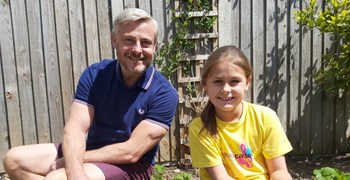03/06/2020
Q&A with CEO Robin Plaster
One Broker CEO Robin Plaster tells us about his career in insurance, the impact of coronavirus and his hopes for the future.
To set the scene, can you tell us about your career to date?
I left school aged 16 without a single O level. I don’t say that like it’s a badge of honour – far from it – but I didn’t like school and school didn’t like me.
I couldn’t wait to start work and was fortunate to land a job with an insurance broker in the West End of London. I couldn’t believe my luck. I was 16 and confronted with the bright lights of the West End, a dynamic working environment, lavish bars and restaurants and, best of all, someone was paying me to be there!
I instinctively knew that a career in insurance was right for me. To this day people assume that working in insurance is boring. And while there are mundane aspects, it’s an exciting and fast-moving marketplace, full of interesting individuals.
After leaving my first employer, I secured a series of senior positions at other insurance brokers and underwriting agencies. The diversity of the roles proved to be a key element in shaping my career.
I moved to Norfolk in the 1990s and set up the One Broker Group in 2010. It’s arguably one of the most dynamic and successful broking businesses in the UK.
What makes One Broker different from other insurance brokers?
Our biggest differentiators are our levels of expertise and service.
We’re more akin to a national broker in terms of the level of expertise we offer, but unlike them, we provide a very personalised service to our clients. Conversely, most local brokers offer great service, but don’t have the resources to take on the calibre of individuals we employ. Our guys have a deep understanding of the larger more complex risks, as well as numerous specialist sectors, such as tenant management organisations, classic cars, private ambulances, housing warranties, motorcycle dealerships, thatch and barns etc. As a result, they can provide clients with great advice, that’s specific to their industry sector.
Many high-profile clients work with us because they get access to knowledgeable staff who understand the insurance risks of their industry, as well as getting a high level of service. They get regular visits from us; we do all sorts of analysis and go way beyond the services of an average insurance broker. For example how many brokers do you know that actively engage with their clients on risk management, disaster recovering planning etc... my guess is not many!
That’s why we have such a focus on learning and development. We want our teams to have the skills they need to do the job. We encourage people to take their exams and we pay for them. There’s a raft of initiatives, including training and mentoring, both on the job and externally.
What does a typical day look like?
My mission has always been to hire the very best people I can find, and that’s exactly what I’ve done at One Broker.
Hiring a top-flight management team has allowed me to step back from all day-to-day activities and act in a more strategic capacity. Too many business owners in our industry think they know it all and are the only person who can make a ‘good’ decision. In my experience, this is down to a degree of arrogance and personal insecurity. It often means they micro-manage their teams, which can stifle innovation and growth.
How has the COVID-19 pandemic affected One Broker?
It’s too early to tell.
Historically insurance brokerages have been robust because almost everyone needs insurance of some sort. The current pandemic hasn’t changed that. However, there will be clients that don’t manage to stay in business; this may affect our performance.
What measures has One Broker taken to protect staff?
We have gone out of our way to ensure the physical and mental wellbeing of our wonderful staff.
We are acutely aware of the need to maintain a high level of communication, by way of the telephone and video conferencing, in the absence of office interactions. This is key to maintaining a good level of morale.
On a practical level, we’re still working out how the phased return to an office environment will work. Social distancing is, of course, a key factor in this process.
How have staff reacted to working from home?
Very well. We were able to get everyone set up at home in a matter of days.
Some people have found the lack of face-to-face interaction with colleagues and the routine of physically going into the office everyday difficult, but most have coped incredibly well.
Several members of staff have even enjoyed aspects of this enforced change to their working life, especially the extra time with family and the absence of commuting.
What does the post-COVID-19 world look like for your business?
It’s hard to say.
Society will resume some form of normality, but I suspect ‘normal’ won’t look the same as it did, for many years to come.
Even if a vaccine is developed, people will remain concerned about a new pandemic arising in the future. This will shape the way in which society and businesses behave.
Aside from the personal safety element, the level of debt in the UK and worldwide will result in tax increases, which is never good for business.
Are you concerned about the potential damage to the insurance industry’s reputation during the pandemic?
Yes. The criticism and public outrage around some ‘woolly’ policy wordings is, in my opinion justified, but the presumption that an insurance contract should pay out under almost any circumstances is not.
The reality is that this pandemic has taken the world by surprise and the vast majority of policies weren’t designed or priced to provide cover in such an eventuality.
How has the pandemic affected you personally?
In both a positive and a less than positive way.
The considerable loss of life to date has been upsetting. But the way people have adapted shows tremendous resilience and fortitude. I have heard people likening it to the Second World War, where camaraderie was a significant factor in winning the war and re-building our towns and cities.
On a personal level the lockdown has prompted me to reevaluate certain aspects of my life. I’ve taken up gardening over the past few weeks, which, to my surprise, I’ve found very rewarding.
The biggest challenge for me, by far, has been not seeing my 3 wonderful children.
The media has focused a lot on the negative aspects of the pandemic. Can you take any positives away from the experience?
People have adapted to a slower pace of life. In this country, we’re normally racing around at 200mph but we’re not really sure why. The lockdown has forced us to reassess our lives. As a result, lots of people have found new strengths and passions, which is really nice.
What are you most looking forward to after lockdown?
Being able to travel again. There are so many places I want to visit. Although we can’t fly anywhere at the moment, I can still dream about it!
Related Articles





